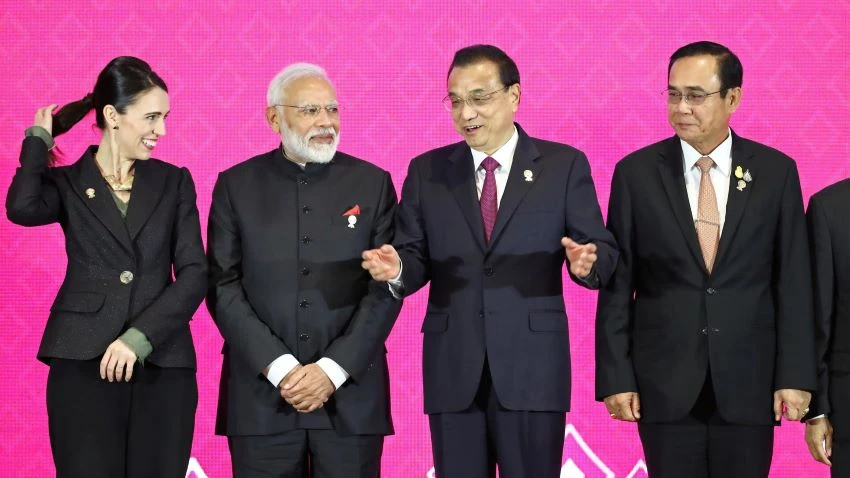
India has dropped hints that it is still open to joining what would be the world's largest free trade pact if its "core concerns" are met despite opting out of the 16-nation agreement just three days ago.
"We have negotiated with a very clear-eyed view of our interests. We negotiated hard," India's External Affairs Ministry spokesman Raveesh Kumar said Thursday in response to a question on the Regional Comprehensive Economic Partnership. "If we get a firm indication that our core interests will be accommodated, at that stage we can think of taking any further decision in this matter."
At the RCEP summit on Monday in Bangkok, 16 nations, including China, India, Japan, South Korea, Australia, New Zealand and the 10 members of the Association of Southeast Asian Nations, failed to reach an agreement on a massive free trade deal that would encompass over 3.6 billion people and about a third of the world's gross domestic product.
Indian Prime Minister Narendra Modi said his country decided not to join the RCEP because it did not see a "fair and balanced outcome" following seven years of negotiations. India's demands included protection from a flood of cheap Chinese goods, including provisions that the goods would not flow in from other member countries; shift of the base year for tariff cuts to 2019 from 2014; and an auto-trigger mechanism that would enable it to increase duties in case of an "indiscriminate" import surge.
On Monday, the Indian government did not clarify whether it was exiting RCEP permanently. Some clarity, however, came a day later when Commerce and Industry Minister Piyush Goyal, who participated in the RCEP ministerial talks in Bangkok, said that if all of India's demands are addressed then there is still a possibility of negotiations.
"For the present, it is the final decision [that] we are not joining RCEP," Goyal said, adding if all the Indian demands are met, that will strengthen Indian industry, give it more scope to grow and open better export markets while balancing the trade deficit that India is suffering, "then I think every government is always open to discussions and negotiations.
"Should the other countries come up with better offers which are in India's interest, in the interest of India's industry and the people's interest, we will discuss it with our industry... and do what is good for our farmers, industry and services sector."
Given its trade deficit of over $50 billion annually with China, India fears that lowering tariffs under RCEP may harm its domestic industries and farms. It also tried to keep its agriculture sector, including dairy, out of the proposed deal.
Goyal said India consistently stood its ground during the RCEP negotiations to uphold its demands, including on managing the trade deficit and greater protection against unfair imports.
"India has not got out of the pact in an acrimonious manner," he said, adding that at the ministerial meeting all the countries assured New Delhi that they still wanted it to be part of the regional trade agreement and would make an effort to address its concerns, which was reflected in the final leaders' statement.
"In international engagements and international relations, whether political, geopolitical, trade, economic, we always talk to countries. The doors never shut with anybody. But as I said for the present, the decision [to exit RCEP] is absolutely final but... if the 15 RCEP nations make a sincere effort to resolve our concerns, to give us confidence, and help us to balance this trade inequality, then I think every nation should talk to their friends," he said.
China, meanwhile, too said it would work with other participating countries to resolve the outstanding issues flagged by India. "I want to stress that the RCEP is an open initiative," its Foreign Ministry spokesperson Geng Shuang said Tuesday.
"China will continue to work with all parties to resolve the outstanding issues for India through negotiations in the spirit of mutual understanding and accommodation. We welcome the joining of India at an early date."




















